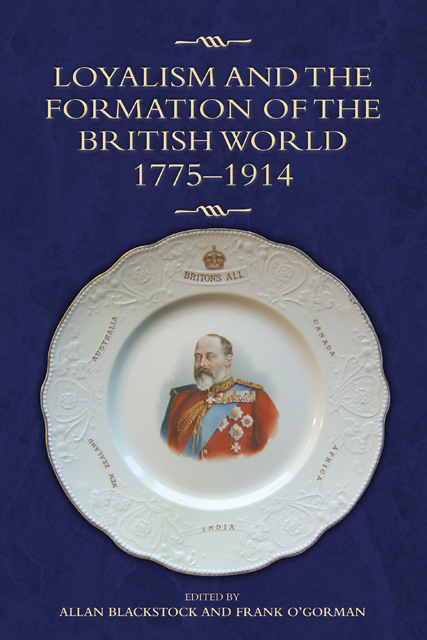Book contents
- Frontmatter
- Contents
- Notes on Contributors
- 1 Loyalism and the British World: Overviews, Themes and Linkages
- 2 Origins and Trajectories of Loyalism in England, 1580–1840
- 3 The ‘Spirit of Loyalty’: Material Culture, Space and the Construction of an English Loyalist Memory, 1790–1840
- 4 Anti-Catholicism and Orange Loyalism in Nineteenth-Century Britain
- 5 Loyalty and the Monarchy in Ireland, c.1660–c.1840
- 6 The Trajectories of Loyalty and Loyalism in Ireland, 1793–1849
- 7 Presbyterians, Loyalty and Orangeism in Nineteenth-Century Ulster
- 8 Unionists and Patriots: James Whiteside, the Irish Bar and the Dilemmas of the Protestant Nation in Victorian Ireland
- 9 Loyalism in British North America in the Age of Revolution, c.1775–1812
- 10 ‘A Colonial Hybrid’: Nineteenth-Century Loyalism as Articulated by the Orange Order in the Maritime Colonies of British North America
- 11 Canadian Catholics, Loyalty, and the British Empire, 1763–1901
- 12 Loyalism in Australasia, 1788–1868
- 13 ‘We love one country, one queen, one flag’: Loyalism in Early Colonial New Zealand, 1840–80
- 14 Clientelism, Community and Collaboration: Loyalism in Nineteenth-Century Colonial India
- Select bibliography
- Index
4 - Anti-Catholicism and Orange Loyalism in Nineteenth-Century Britain
Published online by Cambridge University Press: 28 February 2023
- Frontmatter
- Contents
- Notes on Contributors
- 1 Loyalism and the British World: Overviews, Themes and Linkages
- 2 Origins and Trajectories of Loyalism in England, 1580–1840
- 3 The ‘Spirit of Loyalty’: Material Culture, Space and the Construction of an English Loyalist Memory, 1790–1840
- 4 Anti-Catholicism and Orange Loyalism in Nineteenth-Century Britain
- 5 Loyalty and the Monarchy in Ireland, c.1660–c.1840
- 6 The Trajectories of Loyalty and Loyalism in Ireland, 1793–1849
- 7 Presbyterians, Loyalty and Orangeism in Nineteenth-Century Ulster
- 8 Unionists and Patriots: James Whiteside, the Irish Bar and the Dilemmas of the Protestant Nation in Victorian Ireland
- 9 Loyalism in British North America in the Age of Revolution, c.1775–1812
- 10 ‘A Colonial Hybrid’: Nineteenth-Century Loyalism as Articulated by the Orange Order in the Maritime Colonies of British North America
- 11 Canadian Catholics, Loyalty, and the British Empire, 1763–1901
- 12 Loyalism in Australasia, 1788–1868
- 13 ‘We love one country, one queen, one flag’: Loyalism in Early Colonial New Zealand, 1840–80
- 14 Clientelism, Community and Collaboration: Loyalism in Nineteenth-Century Colonial India
- Select bibliography
- Index
Summary
Introduction
Violent anti-Catholicism in Britain reached its apogee with the ‘Gordon Riots’ as ‘King Mob’ went on a rampage that paralysed London for several weeks. Nineteenth-century Protestant militancy yielded nothing to match the bitter ‘no-popery’ antagonism of that turbulent Georgian summer, but an underlying revulsion at Catholicism did not remotely disappear. The revolutionary and Napoleonic periods saw several overlapping expressions of militant anti-Catholic populism as feverish crowds meted out savage violence in expressions of identity that combined anti-radical political, popular religion and xenophobia. Precise fault-lines were, however, not always clear. During the Priestly Riots in Birmingham in 1791 (‘the last great action of an eighteenth-century mob’) the town’s affluent dissenting, reformist population drew rioters’ ire; yet anti-Catholicism pierced the surface too, with cries of ‘No Popery’ heard amidst baying calls ‘for Church and King’. Whilst the latter chant was less audible as the nineteenth century unfolded, the former remained a popular feature of popular loyalism throughout the years surveyed here.
Ireland looms large in discussions of nineteenth-century anti-Catholic loyalism since, in this period, the Irish people, their symbols and religion, largely replaced the French as the antithesis of British Protestant notions of loyalty. The United Irish Rebellion of 1798 reintroduced Irish underpinnings to British anti-Catholicism by bringing ordinary Britons face-to-face with the apparently turbulent disloyalty of Irish Catholics. Militia and troops from northern England and Scotland dispatched to crush the insurgency, which they did – often with great force and brutality – returned with an institutional focus for their patriotic loyalism: the Loyal Orange Institution. Founded in 1795 as a popular Protestant bulwark against rising Catholic assertiveness in Armagh and other Ulster counties, and proliferating during the turbulence of 1798, Orangeism demonstrated that in addition to the disloyal Catholics and Presbyterians of the United Irishmen who were prepared to court French assistance, there existed a loyal body – mainly Anglican at this point – with whom these soldiering Britons could identify.
Irish migrants – more even than Ireland itself – feature strongly in what follows. For along with the military who had fought in Ireland in 1798, a growing number of Anglican migrants from Ulster carried Orangeism with them to western Scotland and northern England, before soldiers and emigrants once again exported it across the Anglo-world.
- Type
- Chapter
- Information
- Publisher: Boydell & BrewerPrint publication year: 2014



